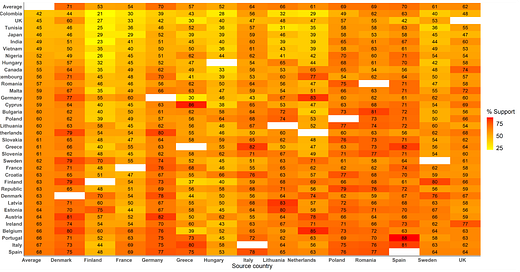#15 Selective Solidarity: Are Citizens Willing to Help Some Foreign Countries More than Others?
Why Europeans favor Some Countries Over Others in Financial Aid
The Trump administration has been moving to cut foreign aid worldwide, a shift that will impact many impoverished nations, including those heavily affected by AIDS. The U.S. State Department stated that "reviewing and realigning foreign assistance on behalf of hardworking taxpayers is not just the right thing to do, it is a moral imperative." This raises an important question: which foreign countries do citizens support their governments assisting financially?
Samir Negash and I recently published an article in the Journal of Common Market Studies, where we analyze data collected at the European University Institute to understand the characteristics of recipient countries that make citizens more or less supportive of their government providing financial aid. We do not argue that foreign assistance should be determined solely by public opinion—most Americans, for example, likely cannot locate many of the neediest countries on a map. However, public sentiment plays a role in shaping foreign aid decisions. But what factors influence citizen support for economic assistance? Is it based on the poverty levels of the target country, democratic governance, low corruption, or cultural and geographic proximity?
In recent years, international redistribution has expanded due to global crises such as the COVID-19 pandemic or the war in Ukraine. These events have forced governments to decide how much financial support they are willing to provide to other countries. However, do citizens support economic assistance equally across all countries? In our research, we show that public support for financial aid is selective: people are much more willing to support economic assistance for some countries than others.
Proximity and Cultural Similarity
A key finding of our study is that citizens are more likely to support economic assistance for countries that are culturally and geographically closer to them. Countries that share a common language with the donor nation, for instance, receive significantly more public support. Similarly, neighboring countries garner more backing than those farther away. This suggests that solidarity is not purely altruistic but is shaped by a sense of familiarity and shared identity.
For example, Spanish respondents in our study expressed strong support for financial assistance to Portugal, while Dutch respondents were more likely to support aid to Belgium. By contrast, support for geographically distant countries, such as Nigeria or Vietnam, was much lower.

Economic Need and Perceived Deservingness
While proximity matters, economic factors also play a crucial role in shaping attitudes toward international redistribution. Citizens are more likely to support economic assistance for countries that are significantly poorer than their own. This aligns with the idea of “deservingness”—countries perceived as genuinely in need are seen as more worthy of assistance.
However, this effect is not universal. Individuals who are generally skeptical of international redistribution tend to place greater weight on economic need when deciding who should receive aid. Meanwhile, those who already support international redistribution are more likely to favor financial assistance across the board, regardless of the recipient country's economic status.
Another key factor influencing public support for economic assistance is reciprocity. Our findings show that citizens are more likely to support financial aid for countries that are part of the European Union (EU) or have strong trade links with their home country. This suggests that people do not view financial assistance purely as a humanitarian effort but also as an investment in economic and strategic relationships.
For instance, EU membership is a predictor of public support for financial aid. Citizens are significantly more likely to favor redistribution within the EU than to non-EU countries, likely because EU membership fosters a sense of mutual obligation—helping another EU country today might mean receiving help in return in the future.
Trade relationships also play a role. Countries with stronger economic ties tend to receive more support because economic stability in a trade partner is seen as beneficial to the donor country. This self-interested logic suggests that financial aid is often framed as a strategic decision rather than purely an act of altruism.
Governance and Credibility: Does Good Behavior Matter?
Interestingly, our research shows that indicators of good governance, such as democracy levels or national debt, do not have a major impact on public support for economic assistance. While one might expect that citizens would be more inclined to support aid for countries with strong democratic institutions or responsible fiscal policies, we find no significant effect.
This suggests that concerns about corruption or governance quality are not as influential as cultural, geographical, and economic considerations when people decide whether a country deserves financial aid. Instead, immediate economic need and strategic interests appear to be the stronger determinants.
Right-Wing Individuals Are More Selective
Political ideology also plays a crucial role in shaping attitudes toward international redistribution. Right-wing individuals are generally less supportive of financial aid for foreign countries. However, when they do support redistribution, they tend to be more selective, prioritizing countries that are geographically close, culturally similar, or economically connected to their own country.
In contrast, left-wing individuals are more likely to support international redistribution broadly and are less selective in terms of which countries should receive aid. This suggests that while left-wing voters may support aid on principle, right-wing voters are more likely to favor redistribution when it aligns with their national or economic interests.
Afonso, A., and Negash, S. (2024) Selective European Solidarity: How Recipient Country Characteristics Shape Support for International Redistribution in Europe. JCMS: Journal of Common Market Studies, 62: 379–411 https://doi.org/10.1111/jcms.13506


